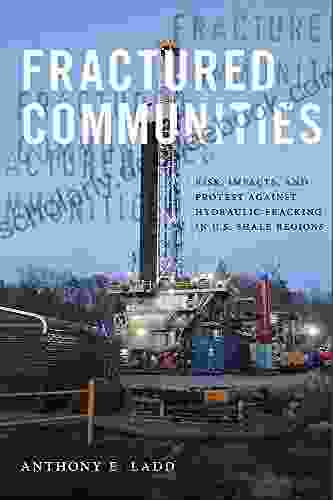Risk Impacts and Protest Against Hydraulic Fracking in Shale Regions: A Comprehensive Analysis

Hydraulic fracking, also known as fracking, is a controversial technique used to extract natural gas and oil from shale formations. The process involves injecting high-pressure water, chemicals, and sand into the shale to fracture the rock and release the trapped hydrocarbons. While fracking has the potential to provide significant economic benefits, it has also raised serious concerns about its environmental impacts and potential risks to human health.
4 out of 5
| Language | : | English |
| File size | : | 1622 KB |
| Text-to-Speech | : | Enabled |
| Screen Reader | : | Supported |
| Enhanced typesetting | : | Enabled |
| Word Wise | : | Enabled |
| Print length | : | 321 pages |
| X-Ray for textbooks | : | Enabled |
In this article, we will provide a comprehensive analysis of the risk factors associated with hydraulic fracking, examining both the scientific evidence and the ongoing protests against this practice in shale regions worldwide.
Environmental Impacts
One of the primary concerns with hydraulic fracking is its potential impact on the environment. The process can lead to the contamination of groundwater and surface water, air pollution, and the release of greenhouse gases. Here are some specific examples:
- Groundwater contamination: Fracking can introduce harmful chemicals into groundwater, which can then be used for drinking and irrigation. Studies have shown that fracking fluids can contain toxic substances such as benzene, methane, and heavy metals, which can cause a range of health problems, including cancer, birth defects, and neurological damage.
- Surface water contamination: Fracking wastewater can also contaminate surface water, including rivers, lakes, and streams. This wastewater contains a mixture of chemicals and brine, which can be harmful to aquatic life and can also make water unsafe for drinking or bathing.
- Air pollution: Fracking operations emit a range of air pollutants, including volatile organic compounds (VOCs),particulate matter, and nitrogen oxides. These pollutants can contribute to smog, respiratory problems, and climate change.
- Greenhouse gas emissions: Fracking also releases greenhouse gases, such as methane and carbon dioxide, which contribute to climate change. Methane is a particularly potent greenhouse gas, with a global warming potential 25 times higher than carbon dioxide.
Health Impacts
In addition to its environmental impacts, hydraulic fracking has also been linked to a range of health problems. These include:
- Respiratory problems: Exposure to air pollutants emitted from fracking operations can lead to respiratory problems, such as asthma, bronchitis, and lung cancer.
- Neurological problems: Some studies have suggested that exposure to chemicals used in fracking fluids can lead to neurological problems, such as headaches, dizziness, and memory loss.
- Cancer: Some studies have also suggested that exposure to fracking chemicals may increase the risk of certain types of cancer, including leukemia and lymphoma.
It is important to note that the scientific evidence linking fracking to health problems is still limited. More research is needed to fully understand the potential health risks associated with this practice.
Protests Against Fracking
The environmental and health concerns associated with hydraulic fracking have led to widespread protests against this practice. These protests have taken place in communities around the world, including the United States, Canada, and the United Kingdom. Here are some examples:
- Gasland: In 2010, the documentary film Gasland brought widespread attention to the environmental and health impacts of fracking. The film has been credited with sparking a nationwide movement against fracking.
- Occupy Wall Street: In 2011, the Occupy Wall Street movement included fracking as one of its key issues. Protesters argued that fracking is a threat to public health and the environment, and that it should be banned.
- People's Climate March: In 2014, the People's Climate March included fracking as one of its key demands. The march called for an end to fracking, as well as other fossil fuel extraction practices.
The protests against fracking have been successful in raising awareness about the risks of this practice and in putting pressure on governments to take action. In some cases, these protests have led to changes in policy, such as bans on fracking in certain areas.
Hydraulic fracking is a controversial practice that has both potential benefits and risks. While fracking has the potential to provide significant economic benefits, it also poses serious threats to the environment and human health. The risks associated with fracking include groundwater contamination, surface water contamination, air pollution, greenhouse gas emissions, and health problems. Protests against fracking have been taking place around the world, and these protests have been successful in raising awareness about the risks of this practice and in putting pressure on governments to take action.
Ultimately, the decision of whether or not to allow fracking is a complex one that must be made on a case-by-case basis, taking into account the specific environmental and health risks involved. However, it is clear that the risks associated with fracking are significant, and that these risks must be carefully weighed against the potential benefits before this practice is allowed to proceed.
4 out of 5
| Language | : | English |
| File size | : | 1622 KB |
| Text-to-Speech | : | Enabled |
| Screen Reader | : | Supported |
| Enhanced typesetting | : | Enabled |
| Word Wise | : | Enabled |
| Print length | : | 321 pages |
| X-Ray for textbooks | : | Enabled |
Do you want to contribute by writing guest posts on this blog?
Please contact us and send us a resume of previous articles that you have written.
 Novel
Novel Page
Page Chapter
Chapter Story
Story Genre
Genre Reader
Reader Library
Library Magazine
Magazine Preface
Preface Annotation
Annotation Manuscript
Manuscript Scroll
Scroll Classics
Classics Library card
Library card Narrative
Narrative Biography
Biography Autobiography
Autobiography Memoir
Memoir Reference
Reference Thesaurus
Thesaurus Narrator
Narrator Character
Character Resolution
Resolution Librarian
Librarian Catalog
Catalog Card Catalog
Card Catalog Borrowing
Borrowing Stacks
Stacks Periodicals
Periodicals Research
Research Reserve
Reserve Reading Room
Reading Room Rare Books
Rare Books Interlibrary
Interlibrary Literacy
Literacy Study Group
Study Group Thesis
Thesis Awards
Awards Book Club
Book Club Textbooks
Textbooks Gary D Schmidt
Gary D Schmidt V D Bucket
V D Bucket Heather Brewer
Heather Brewer John A Lanier
John A Lanier Jacinta Cremades
Jacinta Cremades Jane Heinrichs
Jane Heinrichs Dr Dave Cambrigton
Dr Dave Cambrigton Shannon Brinkley
Shannon Brinkley David Correia
David Correia Richard Mcgregor
Richard Mcgregor Richard Brink
Richard Brink Anna Marie O Brien
Anna Marie O Brien Attila Rettig
Attila Rettig Joan Horvath
Joan Horvath Roderick P Hart
Roderick P Hart S Briones Lim
S Briones Lim Penelope Douglas
Penelope Douglas Lewis Spence
Lewis Spence Vivien Gornitz
Vivien Gornitz Simon Woolley
Simon Woolley
Light bulbAdvertise smarter! Our strategic ad space ensures maximum exposure. Reserve your spot today!

 Jaime MitchellAfrican Coalitions and Global Economic Governance: Empowering the Continent...
Jaime MitchellAfrican Coalitions and Global Economic Governance: Empowering the Continent... Dennis HayesFollow ·6.9k
Dennis HayesFollow ·6.9k Ismael HayesFollow ·6.2k
Ismael HayesFollow ·6.2k Glenn HayesFollow ·6.2k
Glenn HayesFollow ·6.2k Ben HayesFollow ·5.2k
Ben HayesFollow ·5.2k Will WardFollow ·15.5k
Will WardFollow ·15.5k Efrain PowellFollow ·5.3k
Efrain PowellFollow ·5.3k Orson Scott CardFollow ·6.3k
Orson Scott CardFollow ·6.3k Galen PowellFollow ·8.3k
Galen PowellFollow ·8.3k

 Houston Powell
Houston PowellMusorgsky and His Circle: A Russian Musical Revolution
Modest Mussorgsky was a Russian...
 Barry Bryant
Barry BryantRanking the 80s with Bill Carroll: A Nostalgic Journey...
Prepare to embark on a captivating...

 Kelly Blair
Kelly BlairThe Diplomat's Travel Guide to Festivals, Holidays, and...
India is a land of vibrant culture and...

 José Saramago
José SaramagoFancy Nancy Nancy Clancy: Late-Breaking News!
Nancy Clancy is back with all-new adventures...

 Trevor Bell
Trevor BellGestalt Psychotherapy and Coaching for Relationships: A...
Relationships...

 Federico García Lorca
Federico García LorcaThe Last Love of George Sand: An Enduring Legacy of...
At the twilight of her remarkable life,...
4 out of 5
| Language | : | English |
| File size | : | 1622 KB |
| Text-to-Speech | : | Enabled |
| Screen Reader | : | Supported |
| Enhanced typesetting | : | Enabled |
| Word Wise | : | Enabled |
| Print length | : | 321 pages |
| X-Ray for textbooks | : | Enabled |










